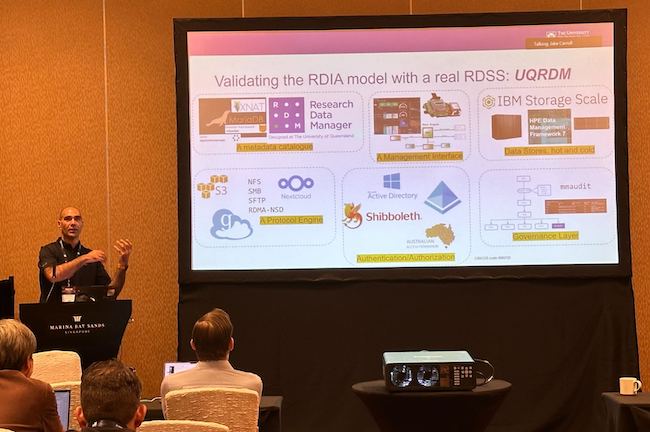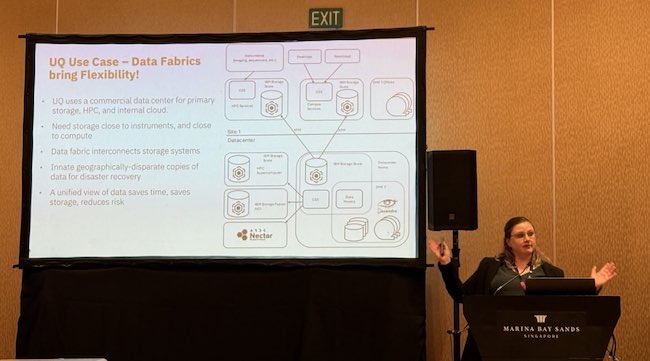RCC Director Jake Carroll and RCC Projects and Digital Research Infrastructure Delivery Manager Sarah Walters presented at the SupercomputingAsia conference (SCA2025, also known as SCAsia) this year in Singapore, 10–13 March. Read their reports below about their conference experience.
SCA2025 outcomes will benefit AI at UQ
By RCC Director Jake Carroll
This year’s SupercomputingAsia conference has resulted in tangible benefits for the University of Queensland’s Artificial Intelligence digital research infrastructure (DRI) initiatives.
During the conference, RCC Projects and DRI Delivery Manager Sarah Walters and I held several meetings with our strategic technology partners, taking the opportunity for face-to-face interactions. These discussions were instrumental in:
- aligning our technical roadmaps with industry developments, specifically in our DRI
- exploring potential collaborative projects with our largest technology partners
- addressing specific implementation challenges faced by RCC
- establishing direct relationships with key technical personnel.
These engagements have translated into actionable next steps that will enhance our DRI capabilities at UQ. One such project is a collaboration between RCC and Hewlett Packard Enterprise (HPE) which has already resulted in UQ’s second next-generation GPU platform for the most demanding AI and high-performance computing applications.
The HPE Cray XD675, powered with AMD EPYC™ 9004 Series CPUs and AMD Instinct™ MI300X GPUs, will be deployed in UQ’s Bunya supercomputer and will support the University’s rapidly expanding initiatives in supercomputing to accelerate AI at scale projects such as generative AI. Please read our separate article about the RCC and HPE collaboration.
Late last year, Lenovo provided UQ with its first AMD MI300x, inside Lenovo’s ThinkSystem SR685a v3 server, for trial and testing in a university scientific research setting. At the time, UQ was the first in Australia’s education sector to trial AMD’s next-generation GPU hardware.
The SCA2025 conference showed me that UQ and RCC are well positioned to innovate even more rapidly, deploy new research enabling technologies, pushing even further around leadership class platforms for our local sector.
Community building across the Asia-Pacific region
This year's SCAsia conference felt different to me. There was an unprecedented opportunity for deep research community engagement and technology partnering potential. It came together in a way I did not expect as many of these important conversations started by passing a familiar face by chance in the many hallways of the Marina Bay Sands Conference Centre. There was an openness and willingness to engage that I’ve not seen before at the much larger conferences.
This was the second SCAsia conference I had been to, but the first time I've attended it in Singapore. The conference was a fantastic platform for advancing research computing initiatives across the Asia-Pacific region.
I helped to coordinate "The Second International Workshop on Documenting and Classifying Research Data Infrastructures (DCRDI-II)” led by UQ Professor Emeritus David Abramson, my predecessor as RCC’s Director.
The workshop proved to be highly successful, attracting participation from the international research computing community and generating meaningful discourse. With 17 speakers from both academia and the technology industry, I felt fortunate to be able to bring this group of presenters and attendees together and be a part of building greater global awareness about the criticality of formal approaches to research data storage analysis.
I am incredibly proud of the work of RCC’s Sarah Walters who presented an excellent paper and conference talk around storage sustainability, and another talk around our research success using next-generation diverse GPU accelerators.
I am pleased to say that RCC was able to leave a lasting positive impression upon our various audiences, with engagement and the ever-important corridor conversations that happened after the talks starting a fresh cycle of international collaborations, knowledge sharing and problem solving with a whole new set of technologies.
Conclusion
The investment of time at the conference has already provided substantial returns in terms of relationship building. The conference was relaxed, the food was excellent and the WiFi was reliable. What more could one ask for, really?
It is sometimes nice to do things closer to home. This was one of those moments.

Jake Carroll presenting at SCA2025.
SCAsia2025: Strong focus on AI and quantum computing
By Sarah Walters, RCC Projects and Digital Research Infrastructure Delivery Manager
The strong focus on AI seen at SCA2024 continued at this year’s conference. There was particular emphasis on storage solutions as the industry is becoming increasingly aware of the need for fast storage and good data management to drive continuing innovation in AI.
There is also an ever-increasing focus on quantum computing at supercomputing conferences, with SCAsia featuring several sessions on this emerging technology.
I really enjoyed the opportunity to co-present a paper at SCA2025 with IBM Software Architect Madhu Thorat on empowering generative AI through sustainable high-performance data lakehouse and data fabric solutions. The paper explored some of the benefits that UQ has achieved through its high-performance data storage fabric, MeDiCI (Metropolitan Data Caching Infrastructure).
I also had the opportunity to speak about some of the amazing AI research that UQ is doing, utilising our new Lenovo SR685a system containing 8 AMD Instinct MI300x GPUs. This led to some engaging conversations with other research organisations across the globe.
The conference provided valuable insights into both regional priorities and global trends in high-performance computing.

Sarah Walters presenting at SCA2025.



